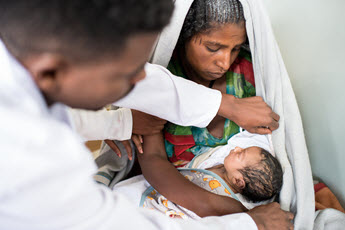Features
Problem-solving with Communities Improves Health Care Behavior and Practices

Involving communities in planning and monitoring the health care services they use helps improve health outcomes. The Last 10 Kilometers (L10K) 2020 project, funded by the Bill & Melinda Gates Foundation, has been supporting communities in Ethiopia to take ownership of their health care for over a decade with innovative strategies including community-based data for decision making and participatory community quality improvement. Through strategies like these, community members are able to draw attention to challenges that affect their access to quality services and help implement solutions so that more people receive the care they need.
Recently, L10K 2020 published the article "Effectiveness of Participatory Community Solutions Strategy on Improving Household and Provider Health Care Behaviors and Practices: A Mixed-Method Evaluation," which presented the findings of the project's evaluation of its participatory quality improvement strategy to improve the use and quality of maternal and newborn health (MNH) services in eight primary health care units.
L10K 2020 implemented the Participatory Community (PC) Solutions Strategy, a four-step quality improvement process (plan-do-study-act), between March 2016 and October 2017. The strategy involved community members, health extension workers (HEWs), health center staff, woreda health office staff, and referral hospital staff in conversations to identify challenges and propose solutions to increase the uptake of ante- and postnatal care and skilled delivery services. Through these conversations, participants identified problems related to health workers' capacity to deliver or link to services, as well as cultural norms around disclosing pregnancy in the first trimester. Using this information, L10K 2020 worked with the health facilities and community members to design interventions to strengthen health workers' skills and increase community awareness about MNH services.
"As positive consequences…we established strong relationships among community, WDAs, HEWs, and health centers staff." – Interviewee from SNNP
To evaluate the impact of the strategy, L10K 2020 conducted household surveys with women who had children younger than one year of age to compare changes in maternal and newborn health care indicators in the 39 communities that received the intervention and the 148 communities that did not. The project also interviewed community volunteers, health extension workers, health center directors and staff, and project specialists. Analyses of the surveys showed improved uptake of both skilled delivery and postnatal care that is attributable to the intervention.
Those interviewed reflected positively on the process and observed improvements in women's understanding of the importance of early antenatal care, stronger linkages within the health system and between the community and the health system, and better methods to evaluate the quality of MNH services. Participants also reported that the PC Solutions strategy created a sense of ownership and shared responsibility for implementing MNH interventions.
"From [this strategy], I learned how to review my work with evidence and how to generate change ideas, if the work does not bring change." – Interviewee from Amhara
Engaging communities to design and implement interventions yields local solutions to local problems. Working with communities also increases the demand for quality health care services, making it more likely that these services are accessible and available in the long term.
